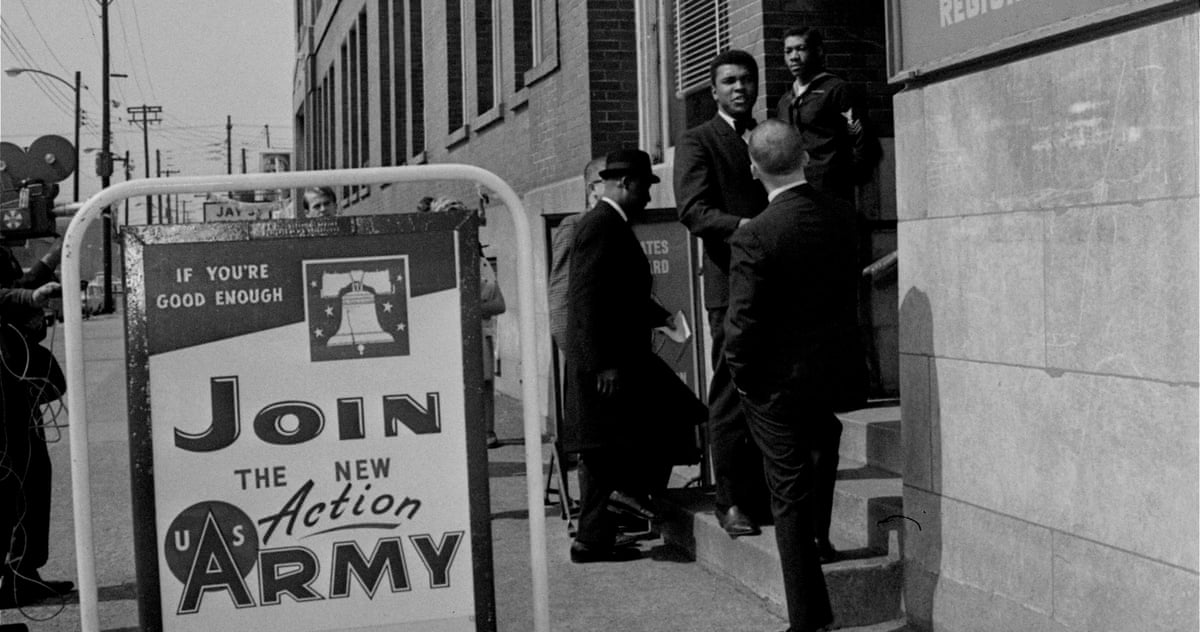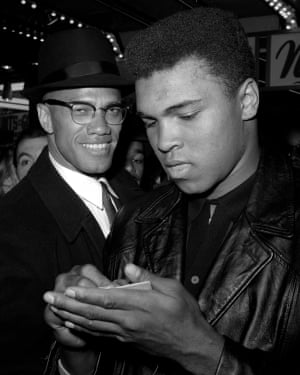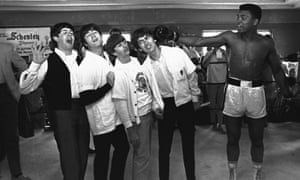From the Vietnam war to Islam the key chapters in Ali’s life

Wherever the great dramas, triumphs and tragedies of a generation were, there was Muhammad Ali

Ali and Vietnam
Cassius Clay, as he was then, was not so much a fighter for peace as a peaceable fighter who needed a reason to fight and Vietnam was not that reason. He might have feared he could serve in Vietnam when registered 1-A for the draft in 1962, but thought little of it. He was, as Muhammad Ali, reclassified in 1964 as mentally unfit for duty when he failed an IQ test.
But the Army lowered the bar and he was back in the mix two years later, now the heavyweight champion of the world and the very public face of the Nation of Islam. Boxing authorities stripped him of his title in 1967 on the day he was convicted in just 21 minutes for resisting the draft. Now unemployed, but supported by a growing list of celebrities, he entered a three-year legal battle to stay out of prison, and won his appeal when the supreme court overturned the decision 8-0 in June 1971.
The gesture cost him an untold amount of money but consolidated his reputation as a man of principle, especially among younger war protesters. Did he really say any version of “I ain’t got no fight with no Vietnamese or Ain’t no Viet Cong called me nigger?” More than likely.
and Islam/politics
It was the Nation of Islam, a group little known or understood at the time, who lurked in the background of Ali’s young life before he even turned professional after winning an Olympic gold medal in Rome in 1960.

But from the time Malcolm X began tutoring him in the teachings of Elijah Muhammad in 1962, he was a committed follower.
He famously changed his name, first to Cassius X then Muhammad Ali, before he fought Sonny Liston for the world title in Miami in February, 1964, but the promoter, Bill McDonald, persuaded him to delay the announcement until after the fight.
Soon after, Malcolm X was banished by the Nation, and assassinated in Harlem the following February. Did Ali know of the plot to kill his former friend? It has never been properly established. But they had certainly grown apart shortly after the all-American Olympic hero became a subtly controlled professional champion, and embarked on a new phase of his career.
He was fiercely proud of his religion and his new identity. What’s my name? became the boxers calling card in those turbulent years, and many an opponent suffered for their refusal to accept him as Ali.
Ali left the Nation of Islam in 1975, embracing Sunni Islam, and he retained his faith for the rest of his life.
as a fighter
Clay/Ali certainly beat Sonny Liston on merit in their first fight. Whether or not the dethroned and ageing champion, notoriously a mob stooge, debt collector and ex-con, showed proper enthusiasm for getting up after Ali clipped him on the chin in the first round of their rematch in Lewiston, Maine, in 1965, is doubtful. Liston was quietly eased from the scene as an unwanted villain.
Now Ali was moving towards his physical peak. His speed and unorthodoxy bamboozled every contender, from rock-chinned plodders such as George Chuvalo to more brittle-skinned hopefuls such as Henry Cooper and Brian London, who entertained him briefly on his European sojourns. Floyd Patterson suffered at his hands, as did more ambitious opponents, Ernie Terrell and Cleveland Big Cat Williams.
These were the dazzling pre-banishment early years. We had seen nothing like it. Nor would we again. He did everything wrong, the experts said: he led with his right, he retreated in straight lines, he mugged for the crowd. He entertained in a business that takes itself very seriously. His performance against Williams might have been the most technically perfect of his career, but there would be nights when he would be dragged to the very edge of his commitment to the sport.
[AdSense-A]
Africa, Manila and the decline
After his return from exile, Muhammad Ali entered into a rivalry with Joe Frazier that would both enrich and destroy the men, leaving all witnesses to their extraordinary fighting spirit awe-struck and perhaps a little guilty. The Fight of the Century at Madison Square Garden in 1971 was just that, Joe’s left hook flooring Ali, who got up but lost for the first time.
The aura was roughed up, but the self-belief was strong. Both fighters meandered apart for a while, before Ali was then drawn to his African roots, splitting $10m with the feared conqueror of Frazier, George Foreman, courtesy of a deal Don King brokered with the corrupt and merciless president of Zaire, Mobutu Sese Seko.
It was Ali’s crowning night of a comeback to shake up the world as much as his arrival a decade earlier. He knocked George out but then made the biggest mistake of his life. In 1975, he was reunited with Frazier for the Thrilla in Manila. Joe quit on his stool in the 14th round just before Ali was about to do the same.
Within six years they retired within eight days of each other, spent and physically wrecked. As Hugh McIlvanney famously said of Ali’s departure from his ill-judged fight with Trevor Berbick in the Bahamas in 1981, it was like watching a prince leave town on the back of a dustcart.
as a celebrity
Acclaim was Ali’s oxygen. He craved a smile as assiduously as he would avoid a left hook, and so natural was he in front of a microphone that he often reduced his inquisitors to silent witnesses, most famously Michael Parkinson, whose interviews with Ali are the stuff of legend.

As the 81-year-old television broadcaster remarked on Radio 4 on Saturday when he heard the news of Alis passing: …he revealed in an interview with me the fact that he was suffering from some kind of illness, which was later to consume him and caused his death.
That Parkinson shared his surname with that affliction was no cause for levity between them, of course, but theirs was an easy chemistry. Ali responded to the gentle chiding, and appreciated room in which to move verbally.
He had a similar, but slightly louder relationship with the toupee-wearing American broadcaster Howard Cosell, who sometimes let his ego dip to accommodate Ali at his most rampant in post-fight interviews. They became close friends, Cosell a leading light in campaigning for Alis return to boxing after his ban for refusing to fight in Vietnam.
No matter who sat or stood opposite him in an interview, however, there was only one real star in the room.
and Parkinsons
The disease that struck Muhammad Ali down arrived not in his prime but at the stage of his fighting career when he should not have been anywhere near a boxing ring.
His friend and biographer, the late Jose Torres, himself a fine world champion once in the light-heavyweight division, related in a conversation we had in New York many years ago that he suspected Ali had Parkinsons disease when he fought Larry Holmes, the second-to-last bout of a career that had already stretched five or six years too long.
Torres asked at Alis bedside after the Holmes fight at a parking lot at Caesars Palace in Las Vegas what the medicine near him was for, and did not for a minute believe they were health supplements.
It was L-Dopa, Torres claimed, describing the drug used to alleviate the symptoms of Parkinsons disease.
Cruelly, it was not until several years later that Ali admitted he was suffering from the disease. By then, he had grown uncharacteristically quiet. He moved clumsily. His hands shook. He was a sad shadow of the great athlete who had thrilled the world.
And Ali was resigned to his fate, which gave him an endearing nobility. The smile would still be there occasionally, and the sense of mischief never left him.
There is an exhibition at the O Arena in London that lays out in splendid detail many of the highlights of Alis career. Thousands have thronged to see it just as they did when he first came to the UK in the 1960s. There was always a receptive audience for him here, either as Cassius Clay when he fought and was knocked down by Henry Cooper in 1963, or in later visits as Ali, again beating Cooper and poor, outclassed Brian London in 1966.
Wherever he went, he was mobbed. He mugged for the camera in bowler hat and City gents attire. Former world champion Ricky Hatton remembers their meeting with fondness. He said it was a dream come true when Ali opened his gym in Manchester seven years ago. We took him for a walk around Hyde afterwards and the place came to a standstill. Everywhere you looked there were people pulling over in their cars just so they could get a glimpse of the man. Theres few things that have pleased me more than seeing the people of our small town so thrilled at someones presence.
as myth maker
Did he really lose his bicycle when he was 12 then run to report it to a local policeman in Louisville, who just happened to be a boxing coach?
Almost certainly, as other people have corroborated the story although the thief has never come forward to claim his slice of reflected fame. Yet Alis penchant for mischief-making and white lies made him the perfect showman. He drove the show from start to finish, and promoters such as Don King and Bob Arum could hardly have wished for a better client.
But there is one story in Alis life that probably would not survive intense forensic examination if it were even possible and that is that he threw his Olympic gold medal into the river after a confrontation with racist bikers that left him disgusted and disillusioned after representing his country so proudly in Rome in 1960.
As the perceptive sports writer Jerry Izenberg once said: If they trawl the Ohio river for a thousand years, they are more likely to find a mermaid than an Olympic gold medal. It is a rebuttal that Ali himself would have found heartbreakingly funny and true.
Read more: https://www.theguardian.com/sport/2016/jun/04/muhammad-ali-key-chapters